This repository contains documentation for the yuca cellular automata library, and supporting resources for publications using the library.
https://mybinder.org/v2/gh/riveSunder/yuca/gecco_2022_pages?urlpath=/proxy/5006/gecco_bokeh_app
virtualenv /my/env_path --python=python3.8
source /my/env_path/bin/activate
Install requirements:
git clone https://github.com/riveSunder/yuca.git
cd yuca
pip install -e .
Run testing:
python -m testing.test_all
The tag argument (-t or --tag) currently has important implications for evolution runs. Including 'orbium' or 'geminium' in the tag string is used to set the neighborhood kernel used by the CA. Only the kernels from Lenia CA Hydrogeminium natans and Orbium are supported right now, and if neither is included in the tag the neighborhood kernel parameters will be sampled from a random uniform distribution. The neighborhood kernel is currently not evolved (only the update function parameters are), so it's not recommended to rely on randomly initialized kernels (yet).
python -m yuca.evolve -b 64 -c 256 -d cuda:0 -g 20 -k 13 -l 3 -m 128 -p 16 -s 42 -t my_geminium_tag
To evolve patterns 'pattern' must be included in the tag (-t). It also wouldn't make sense to have a batch size (-b) or replicates (-l) greater than 1, because CPPNs and CA dynamics are both ostensibly deterministic (although floating point precision errors do sometimes play a role).
You can evolve patterns by loading a config file (-cc or --ca_config arg) or a progress log from a CA evolution run (-i or --input_filepath), the former is recommended.
python -m yuca.evolve -b 1 -c 256 -cc ca_configs/orbium.npy -d cuda:0 -g 20 -m 129 -p 128 -s 42 -t orbium_pattern_search
This information can be accessed by entering yuca.evolve --help
"-b", "--batch_size"
type=int
default=64
help="number of grid instances (vectorization)"
"-c", "--ca_steps",
type=int
default=1024
help="number of ca steps to search for"
"-ca", "--ca_fn"
type=str
default="CA"
"-cc", "--ca_config"
type=str
default=None
help="filename (or filepath) designating a ca_config to load"
"-d", "--device"
type=str
default="cpu"
help="device to use (cpu, cuda, or cuda:x)"
"-dt", "--dtype"
type=str
default="float32"
help="set default dtype in torch"
"-e", "--selection_mode"
type=int
default=0
help="selection mode: 0: truncation, 1: rand. tourney, 2: proportional"
"-f", "--env_fn"
type=str
default="HaltingWrapper"
"-g", "--generations"
type=int
default=32
help="number of generations to train"
"-i", "--input_filepath"
type=str
default=None
help="npy log file training curves etc."
"-k", "--kernel_radius"
type=int
default=13
help="kernel radius. kernel shape will be 2r+1 by 2r+1)"
"-l", "--replicates"
type=int
default=1
help="number of replicates to use in get_fitness"
"-m", "--dim"
type=int
default=128
help="grid x,y dimension (square edge length)"
"-p", "--population_size"
type=int
default=32
help="number of individuals in population"
"-r", "--prediction_mode"
type=int
default=0
help="prediction mode: 0-vanishing, 1-static end, 2-both"
"-s", "--seed"
type=int
nargs="+"
default=13
help="seeds to initialized PRNGs, can enter multiple integers separated by spaces"
"-t", "--tag"
type=str
default="pattern_search"
help="string tag for identifying experiments"
"-v", "--conv_mode"
type=str
default="circular"
help="padding mode to use, 'circular', 'reflect', or 'zeros'"
